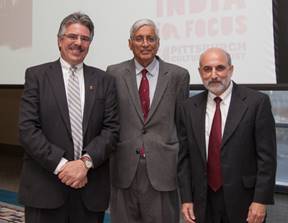By Meghan Collins
Duquesne Law Student and Juris Editor-in-Chief
Note: Shankar Rao Dittakavi, a long-time resident of this area and a well-wisher of the Patrika from its very first issue, is Associate Director at the Duquesne University Center for Legal Information and Allegheny County Law Library. He informed us of this program.
On Thursday, November 5, 2015, Duquesne University School of Law presented an insightful program exploring Mahatma Gandhi’s young life as an attorney in India and South Africa and how the years impacted his future as an international human rights leader.
Dean Ken Gormley organized “Gandhi: The Lawyer†and moderated the panel discussion with two Gandhi scholars: Rajmohan Gandhi and Charles R. DiSalvo.
Rajmohan Gandhi is the grandson of Mahatma Gandhi and a well-known author, scholar and humanitarian. In his career, he has written extensively on South Asian history with a special focus on dialogue and reconciliation between divided communities, including between Hindus and Muslims in South Asia.
Charles R. DiSalvo is the award-winning author of M.K. Gandhi, Attorney at Law: The Man before the Mahatma (Berkeley: University of California Press, 2013). He holds the Woodrow A. Potesta Professorship at the West Virginia University College of Law, where he teaches on civil disobedience.
Mahatma Gandhi, as most people know, was one of the greatest figures of peace in the 20th century. Yet many people do not know that Gandhi was formally trained as an attorney. It was during his time in London that he began to find his calling as a civil leader for the people of India.
The panelists introduced interesting insights into Gandhi’s journey and who he was as a man rather than solely as a political figure.
Gormley asked why Gandhi’s transformative experience of getting forcibly kicked out of a first-class train car in South Africa because he was not white was so significant.
Charles DiSalvo discussed that it was this moment coupled with a courtroom incident, where Gandhi was told to remove his turban, which inspired Gandhi to do something about the way Indians were treated.
“In South Africa, when he found his purpose, he found his voice,†said Rajmohan.
Rajmohan said of Gandhi, “His genius was finding a way to involve millions of people while pointing out the absurdity of British rule.â€
Gormley ended the discussion by asking how Gandhi’s training as a lawyer and his experiences as a lawyer helped shape the person he was, and ultimately what his legacy is.
Charles DiSalvo commented that “The most important thing [that he took from being a lawyer] was that he was turned into a public person; he learned to think, speak, and act in public. He could speak to crowds of thousands of people for hours without notes.†Ultimately, Gandhi’s legacy, says DiSalvo is “whether the work we are doing reaches our deepest moral and political values.â€
Rajmohan said that Gandhi taught us to “[live] for something much more than for ourselves.â€
Duquesne University presented “Gandhi: The Lawyer†in association with the Pittsburgh Cultural Trust’s India in Focus cultural showcase.  Â

